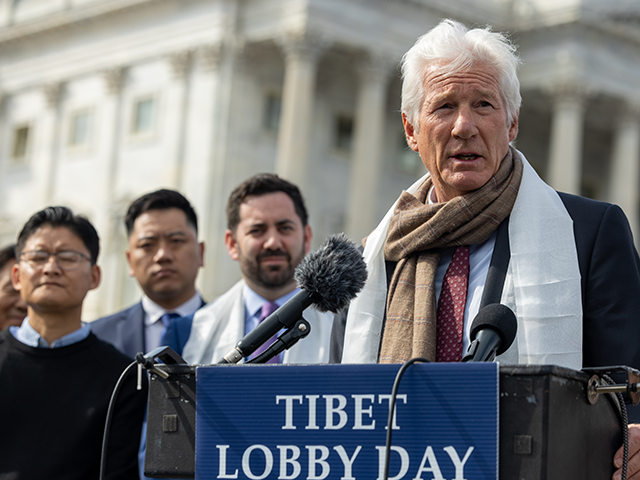Hollywood superstar Richard Gere testified before Congress this week, and made the rounds with lawmakers, to condemn what he called China’s “genocide,” “crimes against humanity” and “longstanding brutality” in Tibet.
Gere, along with several other Tibetan activists and human rights experts, testified on Tuesday before the Congressional-Executive Commission on China (CECC), detailing how the Chinese Communist Party had coopted Tibetan Buddhism, trapped Tibetan nomads in “New Socialist Villages,” and separated Tibetan students from their parents through the coercive boarding school system, meant to ensure Tibetan children do not know their language or traditional faith. Gere testified in his capacity as the Chairman of the Board of Directors for the International Campaign for Tibet.
Gere also participated in a rally on Capitol Hill to mark the annual Tibet Lobby Day, which Tibetan organizations observed on Monday and Tuesday.
SFT Grassroots chapter members from all across the United States have gathered in Washington D.C. to take part in the…
Posted by Students for a Free Tibet on Monday, March 27, 2023
The rally, the Tibetan news organization Phayul reported on Thursday, largely focused on advocating for lawmakers to reintroduce a bill known as the Promoting a Resolution to the Tibet-China Conflict Act, or the Resolve Tibet Act (RTA), that would demand the Chinese Communist Party accept negotiations with the head of Tibetan Buddhism, the Dalai Lama.
Communist mass murderer Mao Zedong invaded and colonized Tibet in 1951 and has been implementing policies to subjugate the indigenous population for decades. The officially atheist Communist Party has emphasized eradicating Tibetan Buddhism in particular, forcing the Dalai Lama into exile in India and disappearing the then-six-year-old Panchen Lama, another high-ranking living Buddha, in 1995. The human rights organization Freedom House ranked Tibet the least free territory in the world, alongside Syria and South Sudan, in its annual “Freedom in the World” report published this month.
In his testimony to Congress, Gere emphasized the modern aspects of China’s persecution of Tibetans, most ominously the use of pervasive surveillance technology and the documenting of the DNA of as many ethnic Tibetans by the government as possible.
“For decades, the Chinese Communist Party’s ethnic policies have been largely predicated on containment, denial, destruction, and assimilation,” Gere said. “Repression has been most severe in Tibet – and in East Turkestan, with our Uyghur friends, it should be noted as well – where CCP policies have included the separation of families, the prohibition of language, the destruction of religious sites and institutions, the collection of DNA and a pervasive surveillance system through which the denial of information or movement is implemented.”
East Turkestian, which China refers to as the “Xinjiang Uyghur Autonomous Region,” is home to an ongoing genocide of Uyghurs and other Turkic, Muslim-majority ethnic groups at the hand of the Communist Party.
“During the next two decades [after 1959], the denial and destruction of Tibetan culture, religion and language, arbitrary detentions and torture is estimated by the Tibetan government in exile, to have resulted in the deaths of 1.2 million Tibetans- or, one-fifth of the country’s population,” Gere explained. “Many more Tibetans languished in prisons and labor camps. More than 6,000 monasteries, temples, and culturally historic buildings were destroyed, their contents pillaged.”
“Literally thousands of ancient Buddhist texts, critical to the legacy of Tibetan Buddhism, and the broader Buddhist community, were burned, looted, or lost in the zealotry of the Cultural Revolution. Tibetans were collectivized leading to unprecedented famine as the CCP sought to so thoroughly erase identity or any resistance mounted,” he continued.
Gere accused China of “acts of genocide” against the Tibetans as well as modern actions that “match the definition of crimes against humanity.” Among them, he noted, was the mass shipment of children to “boarding schools” to be taught Mandarin and indoctrinated into communism. The Chinese state, he added, also demands that Tibetan Buddhist monks “receive Communist state approval before reincarnating,” which he described as “so grossly antithetical to Tibetan Buddhist precepts that it cannot be justified by flimsy or falsified claims of a Communist government professing atheism.”
Gere has been an outspoken critic of China for decades. During the hearing, he noted that his interest in Tibet began 45 years ago, when he “wandered into a refugee camp in Nepal and was astonished by these extraordinary people [Tibetans].”
“The little that I’ve been able to help them in the meantime has only to a very small degree repaid what they have given me in these 45 years,” Gere told Congress.
Once a ubiquitous superstar, Gere began fading from the public eye after his activism against Chinese communism became louder, peaking with an appearance at the 1993 Academy Awards in which he condemned China’s gross human rights abuses on stage.
In the 2022 book Red Carpet: Hollywood, China and the Global Battle for Cultural Supremacy, author Erich Schwartzel revealed that Hollywood producers of blacklisting Gere because his advocacy against communist China made him “too radioactive to hire.” Hollywood began to invest much of its effort in the late 1990s in entering the Chinese box office market, which required approval from Party censors and overlords. Casting a pro-Tibet advocate in a film could mean Beijing would simply ban the movie from the multi-million-dollar market entirely.
In his remarks to Congress, Gere urged lawmakers to pass bills that would pressure China into negotiations with the Dalai Lama and work to prevent American companies from aiding the development of mass surveillance and other technology used to repress Tibetans. Gere called for “concrete restrictions for technology transfer or other U.S company support for forced/coerced DNA or other medical data collection.”

COMMENTS
Please let us know if you're having issues with commenting.